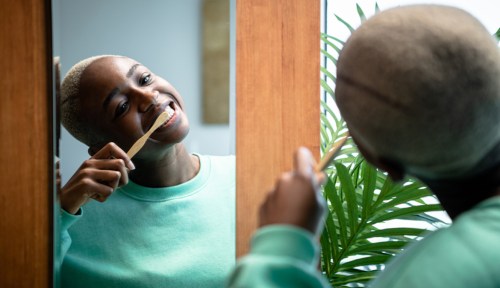Our editors independently select these products. Making a purchase through our links may earn Well+Good a commission
Miss Brushing Your Teeth a Few Times? A Dentist and a Therapist Explain How To Get Back on Track
When you fall behind on brushing your teeth, it can be hard to fight the impulse to scrub away, but here's what to do instead.

Forgetting to brush your teeth every once in a while is a fact of life. Maybe you fell asleep on the couch and didn’t wake up until morning. Or perhaps you struggle to brush your teeth regularly due to a health condition that makes hygiene tasks more challenging. Whatever is causing you to fall behind on brushing your teeth, it’s okay, and you can get your dental health back to a good place.
Experts in This Article
licensed professional therapist, author, speaker, and founder of Struggle Care
prosthodontist specializing in aesthetic dentistry, based out of New York City
How you go about doing that, though, is important, because what you think you should do might actually cause your teeth and gums more harm. We talked with a dentist and therapist about the best ways to get back to brushing your teeth after a short (or long) hiatus.
First, you’ll want to brush your teeth longer, not harder
Whether you’ve been behind on brushing your teeth for a few days, a week, or a couple of months, getting back to a regular schedule is always the best way forward. The one thing you don’t want to do? Make up for missed brushes by brushing your teeth too hard, says Rob Raimondi, DDS, prosthodontist, and co-founder of One Manhattan Dental.
The instinct to brush vigorously makes sense: You missed a few brushes, and your teeth are feeling fuzzier than usual, so you put in some elbow grease during your brush to make up for it. The problem with that, says Dr. Raimondi, is that it can often make matters worse. “Brushing extra hard can wear away at your teeth and gums, creating cuts that cause inflammation. And inflammation in the gums is what presses against the teeth and promotes bacteria,” says Dr. Raimondi.
There is no need to go into full-blown windshield wiper mode on your teeth, but what can you do? “If your teeth feel like they need [to be] extra clean, I always, always recommend going longer rather than harder,” says Dr. Raimondi. The American Dental Association recommends that you brush your teeth for two minutes twice a day with a soft-bristled toothbrush. So, your make-up brushing sessions should be at least two minutes, but probably a minute or two longer to clear away the extra gunk.
For people who can’t gauge the time on their own, a helpful no-cost option is to set a timer on your phone (or a good old-fashioned kitchen timer) while you brush. There are also electric toothbrushes that work on a two-minute timer, so you know exactly when to stop. Other high-tech electric toothbrushes buzz every 30 seconds, so you know when to switch to different areas of your mouth, and even more advanced models have sensors to alert you when you’re brushing too hard.
Here’s a tip for electric toothbrush users: You can just hold the brush near your teeth and let the vibrating bristles do their thing—no extra brushing required. Scrubbing with an electric toothbrush is too hard on your teeth and it’s really not necessary, says Dr. Raimondi. In fact, one sign of a good quality electric toothbrush is that you get a nice clean without having to do any brushing yourself.
4 tips if you are struggling to brush your teeth regularly
Again, having trouble keeping up with hygiene can be really difficult for a lot of people, even though it’s not often talked about, says KC Davis, LPC, therapist and author of How To Keep House While Drowning. For example, some people who struggle with depression may not see the point in taking care of themselves, including their teeth. Others may have sensory overload from the experience of brushing their teeth—making it an uncomfortable task. And for those who live with a chronic illness, such as rheumatoid arthritis or multiple sclerosis, it may be physically painful or challenging to brush.
It’s human to falter with care tasks, full stop. If you’re trying to figure out how to stay on top of brushing, Davis has a few recommendations. But first, take stock of what’s going on with you—that means accepting where you’re at with brushing and trying to figure out what about the experience is deterring you, she says. For instance:
- 1.If brushing your teeth is super boring to you, then a gamified toothbrush that gives you points might make things more intriguing and, therefore, more manageable.
- 2.If you’re experiencing depression, Davis says that prepasted disposable toothbrushes can come in handy when getting up and going into the bathroom seems like too much of a chore.
- 3.If there’s something sensory about the experience that you don’t like—maybe the mintiness of toothpaste is really unpleasant for you—try different flavors of toothpaste or different types of toothbrushes until you find one that you can tolerate.
- 4.If making time is an issue—say, you’re a new parent or have a chronic illness—moving your toothbrush to your kitchen sink can act as a reminder to brush your teeth when you do have a moment.
Above all, she encourages people to see hygiene tasks for what they offer you, rather than a list of character flaws society would have you believe about yourself for struggling with them. Reframe those feelings of failure to be about this—you deserve to feel comfortable and clean, and to avoid any dental problems later on in life. And if you still miss a few brushing sessions, you’ll know how to get back on track.










